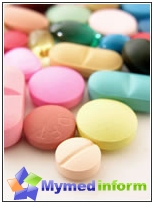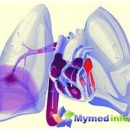The opening of antibiotics produced a revolution in medicine, for the first time doctors got the opportunity to treat infectious diseases. It happened in the 40s of the last century, and now antibiotics are so common that many patients believe that they are dealt with better doctors. Let's see, maybe you still don't know about antibiotics...
Content
Infectious diseases for a long time were the scourge of all mankind. Even after it has been proven that infections are caused by pathogenic bacteria, there were no good antimicrobial agents for almost a hundred years. Preparations used for these purposes differed to toxicity and low efficiency. Only in the 30s of our century, sulfonamide preparations were synthesized, and ten years later - antibiotics. The emergence of these drugs produced a revolution in medicine - for the first time doctors got the opportunity to effectively treat infectious diseases.
Of the best motives to cure more, faster, more efficient, doctors prescribed antibacterial agents always and everywhere where there was a hint of an infection. But unexpected problems were immediately immediately appeared: the bacteria formed resistance to antibiotics, and patients appeared side effects (allergies, dysbacteriosis). In part, it contributed to the emergence of various delusions, relative to antibacterial drugs.
Myth number 1. All antibacterial drugs are antibiotics.
Although in the medical literature the term «antibiotic» It is often used in relation to all antimicrobial agents, true antibiotics are drugs formed by microorganisms or obtained by semi-synthetic methods. In addition to antibiotics, there are completely synthetic antibacterial agents (sulfonamides, nitrofuran drugs, etc.). Medicines such as Biseptol, Furacilin, Furazolidon, Metronidazole, Palin, Nitroxoline, Neversman are not antibiotics. They differ from the true antibiotics with mechanisms of exposure to microbes, as well as by efficiency and general influence on the human body.
Myth number 2. Antibiotics can cure any infectious disease.
This myth is extremely distributed, but antibiotics cannot cure viral and some other infectious diseases. Viral infections make up a significant part of respiratory diseases. Most of the so-called «Overall» (ORZ) do not require the appointment of antibiotics or other antibacterial drugs, as they are caused by viruses to which these drugs do not work.
Viruses are caused by diseases such as influenza, cortex, rubella, chickenpox, epidemic parotitis (pig), infectious mononucleosis, hepatitis A, B, C, etc. With these diseases, as well as at ARZ, antibiotics can be prescribed when bacterial complications appear, that is, the addition of a secondary infection, and the main treatment is carried out by the preparations of other groups (immunoglobulin drugs, antiviral agents).
Antibiotics also do not apply on such pathogens of infectious diseases as mushrooms (yeast-like mushrooms of the genus Candidas, causing milk, and others.), simplest (amcribes, giardia), worms.
Infectious diseases as difftheria, botulism, tetanus are caused by bacterial toxins, so the main treatment is in the introduction of antitoxic sera, without which death may occur even on the background of antibacterial therapy.
In some chronic infections (for example, in pyelonephritis), antibiotics are prescribed only during the exacerbation period, after which synthetic antibacterial agents (Furagin, Nitroxoline, Palin and T.D.) and phytotherapy.
It is extremely undesirable to prescribe antibiotics for the treatment of intestinal dysbiosis due to the negative effects of these drugs on the normal intestinal microflora and the suppression of the intestinal immunity functions.
Myth number 3. Antibiotics - evil, they are extremely harmful to the body, they can not be used in any case.
Many refuse to receive antibiotic prescribed by the doctor even in serious condition. Despite the fact that some antibiotics really have side effects, there are drugs, the purpose of which in parallel with antibiotics as a cover makes it possible to significantly reduce the risk of such complications as allergies (suprastine, tavergil) or dysbacteriosis (bificol, acylact). Dependence on antibiotics is never formed.
Myth number 4. Without antibiotics, it is not necessary if it comes to the life and death of the patient.
Of the acute infectious diseases, the purpose of antibiotics is most often required when pyelonephritis, angins and pneumonia, as well as in infectious inflammation, localized in closed cavities (Otitis, Schimorite, osteomyelitis, abscess, phlegmon). Often it is necessary to assign antibiotics to people after surgery - for the prevention of infections.
Without the use of antibiotics, serious complications are often developing, for example, after untreated anchine antibiotics, heart lesions (rheumatism, myocarditis) and kidneys (glomerulonephritis) may arise.
Without treatment with antibiotics of acute diseases (pneumonia, hymorita, etc.) chronic sluggish diseases (chronic pneumonia, chronic hymorite, chronic urinary tract infection).
There are a number of chronic diseases that significantly worsen the quality of human life, but at the same time are treated only with the use of antibiotics. This is a mycoplasma infection of lungs, jersiniosis, chlamydia and some other urogenital infections.
Of course, assigning an antibiotic, the doctor assesses the testimony and contraindications, weighing the estimated efficiency and risk of side effects.
Myth number 5. If some antibiotic once helped, it can then be used with success and with other diseases.
Pathogens even very similar on the clinical picture of diseases can be very different. Different bacteria have different sensitivity and resistance to different antibiotics. For example, a person got a staphylococcal pneumonia, and Penicillin helped him, then he had a cough again, the cause of which could be mycoplasma, insensitive to penicillin-row drugs. In this case, Penicillin will no longer help. Need to prescribe a drug acting on mycoplasm.
The same antibiotic may not help even with absolutely identical diseases at the same person, since bacteria quickly adapt to the antibiotic and when re-assigned it may not be terrible. Antibiotic, which helped with pneumococcal pneumonia last year, may not work at pneumococcal pneumonia this year!
 Myth number 6. «I can self-yourself (my child) appoint antibiotics treatment without the participation of a doctor».
Myth number 6. «I can self-yourself (my child) appoint antibiotics treatment without the participation of a doctor».
Antibiotics are fraught with ineffectiveness due to improper selection of the drug, the development of side effects due to the inaccurate dosage and the absence of an adequate cover, the development of the stability of microorganisms to the antibiotic due to late cancellation of the drug.
Correctly choose the drug helps the detection of the microbe and the study of its sensitivity to antibiotics, but it is not always possible. Even if the pathogen and its sensitivity to antibiotics are known, it is necessary to choose such a drug that comes to the location of the microbe in the body. The dose of the drug depends on the age and related diseases and does not always correspond to the recommended annotation, since these recommendations are calculated for medium, and not individual parameters.
Myth number 7. «Further the body will cope».
Properly chosen duration of treatment with antibiotics is of great importance. Very often patients independently cancel the antibiotic after 1-2 days of treatment, as soon as it became easier. But the body can not cope, infection will become sluggish, will complicate the lesions of the heart, kidney and t.NS. As a result of premature abolition of the antibiotic, the bacteria strains resistant may appear.
On the other hand, if the antibiotic is undone to be unreasonable, despite the lack of effect, the risk of dysbacteriosis or allergies increases.
Myth number 8. Antimicrobial antibiotic drugs have fewer side effects.
In some cases, self-treatment with sulfanimamides, such as bispetol (bundime, septrine), sulfalen, sulfadimezin, or other antibacterial drugs leads to allergic reactions or dysbacteriosis even more often than when treating antibiotics. In addition, many synthetic drugs have toxic effects on the liver and kidneys, the stability of microorganisms is rapidly developing to sulfanyamides, and they are significantly inferior to modern antibiotics.
Thus, to antibacterial therapy, including with the appointment of antibiotics, it is necessary to refer both to any other treatment: not to be afraid, and apply only under medical control, taking into account the testimony and contraindications.
Bad drugs do not happen - it happens that they are prescribed «Not in the case» and «not to the place» incompetent doctors or self-confident patients and their «Friendly assistants».










